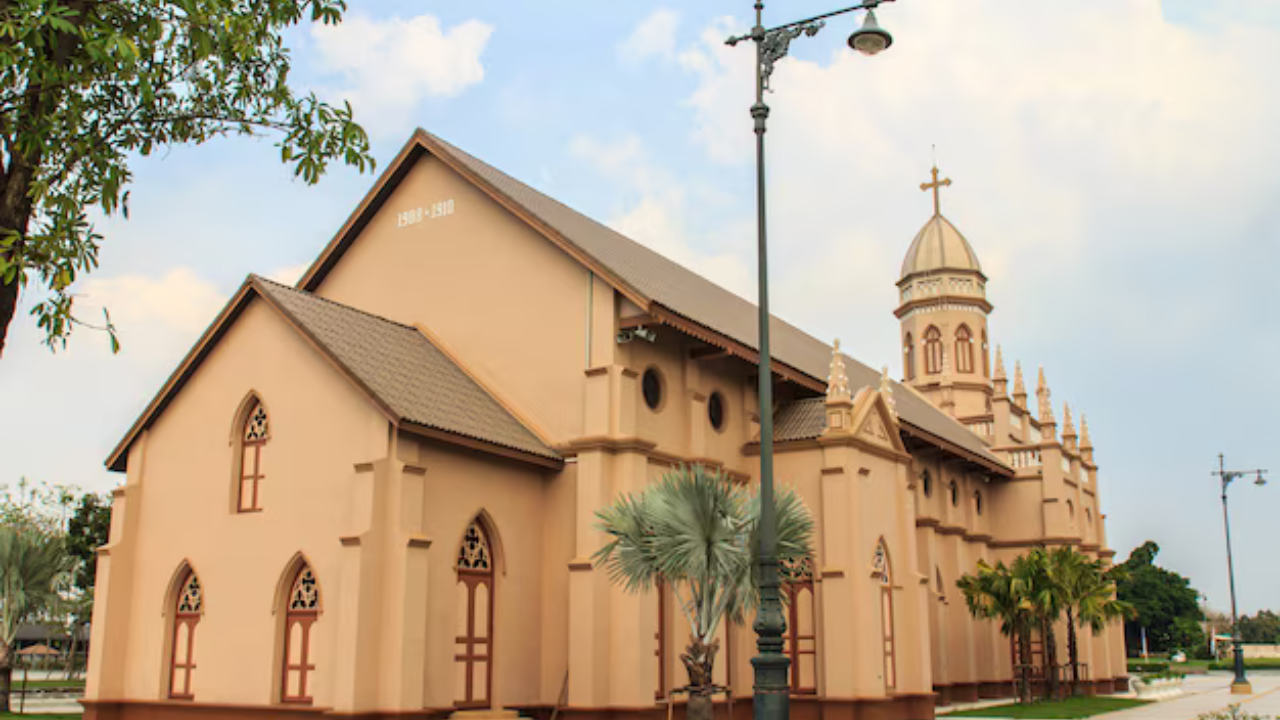Introduction
The Tilchurch movement is revolutionizing the way communities interact with religious spaces. By integrating the traditional functions of churches with inclusive, multi-purpose community functions, Tilchurch is creating new, diverse spaces that go beyond spiritual worship. In a world that is becoming increasingly secular and culturally diverse, the need for multi-functional spaces that cater to a wide variety of needs is more pressing than ever. Tilchurch fulfills this need by offering a versatile environment that embraces religious, cultural, and social activities under one roof. This article explores the origins of Tilchurch, its growing impact on local communities, and why it is gaining traction worldwide.
What is Tilchurch?
A Tilchurch represents a transformative approach to how we view traditional religious spaces. Unlike conventional churches, which focus primarily on religious practices, Tilchurch is designed as a multi-functional venue that serves both religious and secular communities. These spaces are inclusive, welcoming people from various cultural and spiritual backgrounds. Tilchurch offers a place for worship alongside cultural events, community outreach initiatives, educational workshops, and social activities, making it a truly versatile community hub. The core philosophy of Tilchurch is inclusivity—creating environments where people of all beliefs feel respected and welcome.
The Historical Roots of Tilchurch
The concept of Tilchurch can be traced back to the early days of religious institutions, when churches were central to community life. During medieval times, churches were not only places of worship but also centers for community interaction, hosting local meetings, education sessions, and cultural events. These spaces were vital to the social and communal fabric of towns and villages. The Tilchurch movement brings this idea into the modern era, adapting it to the needs of contemporary societies while keeping the spirit of community and inclusivity at its heart.
The Concept of Tilchurch: A Modern Transformation
The rise of secularism and the changing nature of religious participation in modern societies have led many community leaders to rethink how religious spaces can be utilized. The term “Tilchurch” merges the concept of a shift or “tilt” with the traditional idea of a church, reimagining these spaces into multifunctional venues. Today’s Tilchurch does not only offer worship services but also hosts a wide array of community events, social programs, educational initiatives, and support services. Tilchurch is a space where everyone, regardless of belief or background, can connect, learn, and engage in meaningful ways.
How Tilchurch Has Evolved Over Time
Historically, churches were the central meeting places in communities, blending both religious and secular activities. As societies modernized, a distinct separation between religious and secular activities occurred, but some of the community-oriented roles of churches remained. Tilchurch represents the revival of this tradition, bringing back the idea of churches as dynamic spaces for community engagement. Whether it’s a concert, a community meeting, a charitable initiative, or a religious service, Tilchurch offers a place for all types of events, blending spirituality with social impact.
The Growing Popularity of Tilchurches
As more people seek spaces that foster community while supporting diverse needs, the popularity of Tilchurches is on the rise. These spaces attract individuals seeking spiritual experiences and those looking for a place to engage in social, cultural, or educational activities. In multicultural communities, Tilchurches offer a neutral space where people from different backgrounds can gather, interact, and build strong, supportive networks. The adaptable nature of Tilchurches makes them ideal for today’s fast-paced, diverse world.
Why Tilchurch Appeals to Modern Communities

The growing interest in Tilchurches is driven by several societal shifts. As people increasingly desire authentic connections, Tilchurches offer a versatile environment that meets these needs. These spaces go beyond organized religion, creating opportunities for communal activities, cultural exchanges, and interfaith dialogue. In multicultural societies, Tilchurches play a key role in bridging divides, fostering understanding, and creating a sense of unity among people of different backgrounds. The inclusive and welcoming atmosphere of Tilchurches makes them appealing to a wide range of individuals looking for a space that encourages both spiritual and social growth.
The Role of Tilchurch in Community Development
Tilchurches are powerful catalysts for community development. They offer vital services and programs that meet the evolving needs of local populations. These spaces host educational workshops, provide support for social services, and organize charity events, tackling pressing issues like poverty, educational inequality, and mental health challenges. By providing resources that are otherwise lacking in the community, Tilchurches play a key role in improving the quality of life for residents and creating lasting social change.
The Role of Tilchurch in Modern Secular Communities
In many secular societies, traditional religious venues are increasingly underutilized. Tilchurch addresses this issue by transforming these underused spaces into vibrant community hubs. These venues host a variety of activities, such as art exhibitions, concerts, and workshops, creating inclusive environments that attract a diverse range of individuals. This modern take on the traditional church helps to rejuvenate local communities, making these spaces relevant and engaging in today’s world. Tilchurch ensures that these historically significant venues maintain their cultural and community value.
Tilchurch’s Impact on Cultural Exchange and Community Cohesion
One of the most profound effects of Tilchurches is their ability to foster cultural exchange. By offering space for different cultural and religious celebrations, Tilchurches create a sense of shared identity. They provide opportunities for people from diverse backgrounds to learn from each other, celebrate common values, and build cross-cultural understanding. This is particularly important in multicultural societies where social cohesion is essential for community well-being.
The Future of Tilchurch
As the demand for inclusive, adaptable community spaces continues to grow, Tilchurch is poised to play an increasingly important role in global communities. The versatility of Tilchurches, combined with their deep-rooted connection to both spiritual and secular life, positions them as central hubs for the future. As more communities recognize the importance of spaces that support both personal and social well-being, the appeal of Tilchurch will only continue to grow.
The Cultural Impact of Tilchurch
Tilchurch plays a pivotal role in shaping cultural expression within communities. Through hosting diverse events such as music performances, dance shows, and visual art exhibitions, Tilchurch helps preserve and promote local traditions. This not only enriches the cultural landscape but also fosters a sense of unity among community members. By encouraging cross-cultural understanding and collaboration, Tilchurch serves as a bridge between different groups. In multicultural societies, such initiatives are essential for preserving cultural heritage and promoting social harmony, making Tilchurch a cornerstone of cultural exchange.
Tilchurch and Social Support Networks
A key strength of Tilchurch lies in its contribution to social support networks. Many Tilchurch venues offer vital services, such as counseling, youth programs, and senior social activities, providing a safety net for vulnerable populations. During times of crisis—whether due to natural disasters or public health emergencies—Tilchurches often serve as relief centers. They offer essential resources, including shelter, food, and emotional support, proving themselves to be resilient community hubs during challenging times.
The Design Philosophy of Tilchurch
The architecture of Tilchurch reflects its diverse role within the community. Many Tilchurch buildings are repurposed from existing structures, such as former churches or community halls, though new, purpose-built facilities are becoming more common. The design of Tilchurch spaces prioritizes openness and flexibility, with large gathering areas adaptable for a variety of uses.
A typical Tilchurch features multipurpose rooms for workshops, intimate spaces for counseling and support groups, and peaceful areas dedicated to quiet reflection. This thoughtful design enhances functionality and encourages community engagement, making Tilchurch an inviting place for all to participate in the wide range of programs and services offered.
Challenges Facing Tilchurch Today
Despite its numerous benefits, Tilchurch faces challenges in today’s evolving world. Declining church attendance in many Western societies threatens the continuity of these spaces as central community hubs. Furthermore, balancing traditional religious practices with modern cultural trends poses a challenge. To remain relevant, Tilchurch facilities must navigate these complexities while continuing to serve as inclusive, multifunctional spaces.
Adapting Tilchurch to Modern Needs
For Tilchurch to remain relevant in an ever-changing society, it must adapt to evolving social and cultural needs. This may involve embracing digital platforms for virtual engagement, offering programs that cater to diverse demographics, or forming partnerships with secular organizations. By modernizing its approach, Tilchurch can continue to fulfill its role as a vital part of community life, ensuring it meets the expectations of future generations.
Tilchurch as a Hub for Social Connection
Tilchurch is more than just a place for religious services—it serves as a vibrant venue for social events, including weddings, birthday parties, and community gatherings. By offering spaces for both formal and informal events, Tilchurch reinforces its role as a central meeting point for local residents. Celebrating life events in a welcoming Tilchurch environment strengthens community bonds and enhances its value as a communal gathering space.
The Educational Role of Tilchurch
Education plays a significant role in many Tilchurch venues. These centers frequently offer diverse educational programs, such as arts and crafts, language studies, and local history. With a focus on inclusivity, Tilchurch’s educational offerings are designed for people of all ages and backgrounds, positioning the space as a key hub for learning within the community.
Tilchurch promotes lifelong learning, providing community members with ample opportunities for self-improvement and skill development. This commitment to education emphasizes the holistic role Tilchurch plays in enriching the lives of those it serves.
Environmental Sustainability in Tilchurch Design
Environmental sustainability is a cornerstone of many Tilchurch designs. Whether repurposing existing structures or constructing new eco-friendly buildings, Tilchurch spaces aim to minimize their environmental footprint. Many facilities incorporate green technologies such as solar panels and rainwater harvesting systems, showcasing Tilchurch’s dedication to sustainability.
These eco-conscious practices reflect Tilchurch’s forward-thinking approach to community development. As environmental awareness continues to grow, Tilchurch’s commitment to sustainability will become even more relevant to communities worldwide.
Tilchurch and Mental Health Resources
Mental health support is an integral part of the Tilchurch initiative. Many Tilchurch facilities provide safe spaces where individuals can access counseling, support groups, and mindfulness sessions. In today’s fast-paced society, where mental health challenges are increasingly prevalent, the availability of these services is crucial.
By combining mental health support with cultural and spiritual activities, Tilchurch contributes to the well-being of community members, ensuring a holistic approach to health and connection.
How Tilchurch Can Inspire Other Community Institutions
The Tilchurch model offers valuable lessons for other community-oriented institutions, including schools, libraries, and cultural centers. By balancing traditional roles with broader social needs, these institutions can strengthen their ties to the communities they serve. Tilchurch’s adaptability and resilience provide a powerful example that could inspire similar strategies in other sectors, fostering more inclusive and engaged communities.
The concept of Tilchurch not only revitalizes traditional religious spaces but also offers a blueprint for other community institutions, helping them thrive in today’s dynamic social landscape.
Tilchurch in a Global Context
Although “church” traditionally evokes Western Christian traditions, the idea of a central, community-focused religious institution is not confined to any one culture. Various religious traditions around the world combine spiritual practices with social and cultural functions, creating spaces that support both faith and community. These diverse models can offer valuable insights into how the Tilchurch concept can be adapted to different cultural contexts, enhancing its global relevance.
The Future of Tilchurch
Tilchurch has a bright future ahead as more communities recognize the value of flexible, inclusive spaces. As societal needs evolve, the demand for adaptable venues like Tilchurch is expected to grow. The integration of technology and community-focused programming will further strengthen Tilchurch’s role in fostering community engagement.
As the Tilchurch model continues to gain traction, it promises a future where collaboration, cultural exchange, and mutual support are central to community life.
FAQs
Q: What is the primary purpose of Tilchurch?
A: Tilchurch is a versatile space that serves beyond religious worship, hosting cultural events, social gatherings, and a variety of community services, making it an ideal hub for modern communities.
Q: Can anyone attend events at a Tilchurch?
A: Yes, Tilchurch spaces are designed to be inclusive and welcoming to individuals from all backgrounds, regardless of faith.
Q: How does Tilchurch differ from a traditional church?
A: Tilchurch is more than just a place of worship. It hosts a broad range of cultural, educational, and social activities, making it a multifaceted community hub.
Q: What kinds of services are offered at Tilchurch?
A: Tilchurch offers services such as food banks, educational programs, mental health support, and cultural events, tailored to the needs of the community.
Q: Is Tilchurch a global phenomenon?
A: Yes, Tilchurch is gaining popularity worldwide, especially in multicultural areas where inclusive, community-centered spaces are valued.
Conclusion
Tilchurch represents a forward-thinking approach to community spaces, blending spiritual, cultural, and social elements. These venues provide a welcoming environment for individuals to worship, learn, and connect. By bridging traditional values with modern community needs, Tilchurch creates meaningful experiences for everyone—whether for religious enrichment, cultural participation, or simply a space to gather.
As society continues to evolve, the role of Tilchurch will likely become even more important in fostering belonging and mutual support within increasingly diverse communities. With its commitment to inclusivity and adaptability, Tilchurch offers a progressive vision for the future of community life, ensuring that everyone has a place where they feel welcome and valued.
By focusing on these key principles, Tilchurch can continue to thrive as an essential part of global community-building efforts.
Stay in touch for more updates and alerts visit: The Touch Cric!




